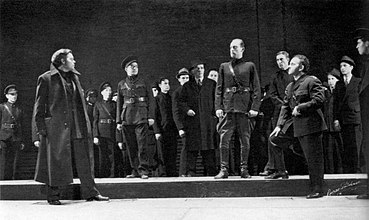What Literary Term Is Contained in This Quote? for Brutus



Et tu, Brute? (pronounced [ɛt ˈtuː ˈbruːtɛ]) is a Latin phrase literally significant "and you, Brutus?" or "as well you, Brutus?", often translated as "You as well, Brutus?", "You lot too, Brutus?", or "Even you, Brutus?". The quote appears in Deed iii Scene 1 of William Shakespeare'due south play Julius Caesar,[1] where information technology is spoken by the Roman dictator Julius Caesar, at the moment of his assassination, to his friend Marcus Junius Brutus, upon recognizing him as one of the assassins. The first known occurrences of the phrase are said to be in ii before Elizabethan plays; Henry VI, Part iii by Shakespeare, and an even earlier play, Caesar Interfectus, by Richard Edes.[2] The phrase is oft used apart from the plays to signify an unexpected betrayal by a friend.
There is no bear witness that the historical Caesar spoke these words.[three] [4] Though the historical Caesar'south terminal words are not known with certainty, the Roman historian Suetonius, a century and a one-half subsequently the incident, claims Caesar said nothing as he died, only that others reported that Caesar's last words were the Greek phrase Kai su, teknon (Και συ τέκνον),[5] [6] which ways "You too, child" or "You too, immature homo"[vii] to Brutus. Opposite to popular conventionalities, the words are not Caesar's last in the play, every bit he says "Then fall Caesar!" correct afterward.[viii]
Etymology [edit]
The name Brutus, a 2d coast masculine substantive, appears in the phrase in the vocative case, and and then the -u.s. catastrophe of the nominative case is replaced past -due east.[ix]
Context [edit]
On March 15 (the Ides of March), 44 BC, the celebrated Caesar was attacked by a grouping of senators, including Brutus, who was Caesar's friend and protégé. Caesar initially resisted his attackers, merely when he saw Brutus, he reportedly responded every bit he died. Suetonius mentions the quote merely equally a rumor, every bit does Plutarch who besides reports that Caesar said cypher, only simply pulled his toga over his head when he saw Brutus among the conspirators.[10]
Caesar proverb Et tu, Beast? in Shakespeare'southward play Julius Caesar (1599)[11] was not the first time the phrase was used in a dramatic play. Edmond Malone claimed that information technology appeared in a work that has since been lost—Richard Edes'due south Latin play Caesar Interfectus of 1582. The phrase had also occurred in some other play past Shakespeare, The True Tragedie of Richard Duke of Yorke, and the death of good King Henrie the Sixth, with the Whole Contention betweene the two Houses Lancaster and Yorke of 1595, which is the earliest printed version of Henry Six, Role 3.[12] [xiii]
Estimation [edit]
It has been argued that the phrase tin be interpreted as a curse or alarm.[14] One theory states that the historic Caesar adapted the words of a Greek sentence which to the Romans had long since become proverbial: The consummate phrase is said to accept been "You besides, my son, will have a taste of ability", of which Caesar only needed to invoke the opening words to foreshadow Brutus' own violent death, in response to his bump-off.[15] The verse form Satires; Volume I, Satire 7 by Horace, written approximately 30 BC, mentions Brutus and his tyrannicide; in discussing that poem, writer John Henderson considers that the expression E-t t-u Br-u-t-eastward, (as he hyphenates it), can be interpreted as a complaint containing a "suggestion of mimetic compulsion".[2]
Come across likewise [edit]
- List of Latin phrases (Due east)
References [edit]
- ^ "No Fear Shakespeare: Julius Caesar: Act three Scene 1 Page 5 | SparkNotes". www.sparknotes.com . Retrieved 2020-07-21 .
- ^ a b Henderson, John (1998). Fighting for Rome: Poets and Caesars, History, and Civil War. Cambridge University Press. ISBN0-521-58026-9.
- ^ Henle, Robert J., Southward.J. Henle Latin Yr one Chicago: Loyola Press 1945
- ^ Shakespeare, William (1960). S.F. Johnson; Alfred Harbage (eds.). Julius Caesar . Penguin Books. p. 74.
- ^ ...uno modo ad primum ictum gemitu sine voce edito; etsi tradiderunt quidam Marco Bruto irruenti dixisse "καὶ σύ, τέκνον". De Vita Caesarum, Liber I, Divus Iulius, LXXXII.
- ^ Suetonius, The Lives of Twelve Caesars, Life of Julius Caesar 82.2
- ^ Billows, Richard A. (2009). Julius Caesar: The Colossus of Rome. London: Routledge. pp. 249–250. ISBN978-0-415-33314-6.
- ^ "Et tu, Brute?". The Guardian. Guardian News and Media Limited. Retrieved 25 January 2019.
- ^ Gill, N. S. "Latin – Vocative Endings". About.com. Archived from the original on February 18, 2012.
- ^ Plutarch, The Parallel Lives, Life of Caesar 66.nine
- ^ "Julius Caesar, Act 3, Scene ane, Line 77". Archived from the original on 2018-01-12. Retrieved 2010-05-31 .
- ^ Dyce, Alexander (1866). The Works of William Shakespeare. London: Chapman and Hall. p. 648.
- ^ Garber, Marjorie. Shakespeare's Ghost Writers: Literature as Uncanny Causality. Routledge, 2010. ISBN 9781135154899. p. 72-73
- ^ Woodman, A.J. (2006). "Tiberius and the Taste of Power: The Year 33 in Tacitus". Classical Quarterly. 56 (1): 175–189. doi:ten.1017/S0009838806000140.
- ^ Woodman, A. J. The Annals of Tacitus: Books five–6; Volume 55 of Cambridge Classical Texts and Commentaries. Cambridge University Press, 2016. ISBN 9781316757314.
External links [edit]
- Et tu, Brute? on Merriam-Webster
Source: https://en.wikipedia.org/wiki/Et_tu,_Brute%3F
Post a Comment for "What Literary Term Is Contained in This Quote? for Brutus"